Pinkerton: Stand with the Chinese People Against Their Communist Regime
by James P. PinkertonThe only way that America can unite the world to contain communist China is if it can unite itself. Today, nobody is under any illusions about the chasm of polarization in the United States, and yet that cleft must be repaired, or at least diminished, if we are to withstand the threat from the Chinese Communist Party (CCP). It’s simple: If China, boasting four times our population, is held together by the iron grip of the CCP, and if the United States is still disuniting, then the communists will win.
To be sure, the U.S. will always have partisanship and division. In a free country, such divides are a feature, not a bug. And yet at the same time, under threat, we must be able to come together as a team. That was the lesson, for example, of the U.S. in World War II.
In the late 1930s, we were plenty split, New Deal vs. anti-New Deal, internationalist vs. isolationist—and yet after Pearl Harbor on December 7, 1941, the nation came together to fight and to win. We held elections all through the war, including a presidential election in 1944, and yet neither party, Democrat or Republican, wanted anything less than full victory overseas. And thankfully, that’s what we got because we had earned it.
Yes, it was a painful victory, coming at the price of more than 400,000 dead, but the alternative—a world dominated by Hitler’s aggression and genocide—was infinitely worse.
A similar story of collective national resolve could be told about the Cold War against Soviet communism, which lasted from 1946—when Winston Churchill delivered his famous “Iron Curtain” speech with President Harry Truman in the audience—until 1991, when came the final collapse of the Soviet Union.
So for nearly half a century, the U.S. engaged in what a great Cold Warrior, John F. Kennedy, aptly described as a “long twilight struggle.” And yet while America’s Cold War consensus was sorely stressed at times, as during the Vietnam War, it held together until the successful conclusion of the struggle, during the presidencies of Ronald Reagan and George H.W. Bush.
Indeed, as we think about our national institutions in times of trial—including, today, the coronavirus crisis—we might be reminded of the idealistic motto of The Grange, that venerable American farm organization: “In essentials, unity; in non-essentials, liberty; in all things, charity.” For our purposes here, we’ll focus on the essential unity—that is, today, the essential of unifying to thwart communist China’s bid for world hegemony.
By now, every American should be familiar with the threat from the CCP’s control of the People’s Republic of China (PRC). The CCP’s so-called “hard power” of economic and military might—much of it gained by manipulating and hacking America these past three decades—has surged.
And yet the CCP’s hard power has been joined by “soft power,” which is intangible, but still important, because it affects the human mind and heart. As the philosopher Blaise Pascal once wrote, public opinion is “the queen of the world.” Oftentimes, soft power is thought of as idealism about, say, freedom or democracy, and yet it can be any sort of opinion, including the concern over victimization and racism. Anyone who thinks that these concerns aren’t powerful forces in the world today hasn’t been paying attention.
In fact, incidents of bias and hate, of all kinds, are painfully real. Yes, incidents have been magnified, exaggerated—and sometimes even fabricated—by provocateurs, aided by an often biased and clickbait-hungry media, and yet abuses have been real—and they are nasty, inexcusable, and sometimes criminal.
It’s in this media-drenched environment that propagandists in Beijing have proven themselves skilled. Skilled, that is, at claiming victim status for China. Skilled also at playing the racism card.
Specifically, when the totalitarianism of the CCP is criticized by an American or by anyone in the West, Beijing spin doctors often respond by dismissing the criticism as racist. That is, Beijing skips past legitimate criticism of the CCP—for its use of slave labor, its religious persecution, its organ harvesting, its political suppression, its carelessness about the coronavirus—and instead hits back on ethnic grievance.
The goal of this sly strategy is to cloak the odious communist regime in the mantle of the Chinese people as a whole—the billion and more who live in Mainland China, as well as the tens of millions who live around the world, including here in the United States. Beijing’s hope is that the crimes of the communist government will thus be hidden behind the dignity and majesty of the Han people, possessors of a proud civilization stretching back 3,000 years.
And we should note that it is the Chinese people who have suffered the most at the hands of the Chinese Communist Party. From the Tiananmen Square massacre in 1989–the anniversary of which comes up on June 4–to the streets of Hong Kong today, the CCP brutalizes the Chinese people in plain sight for the whole world to see.
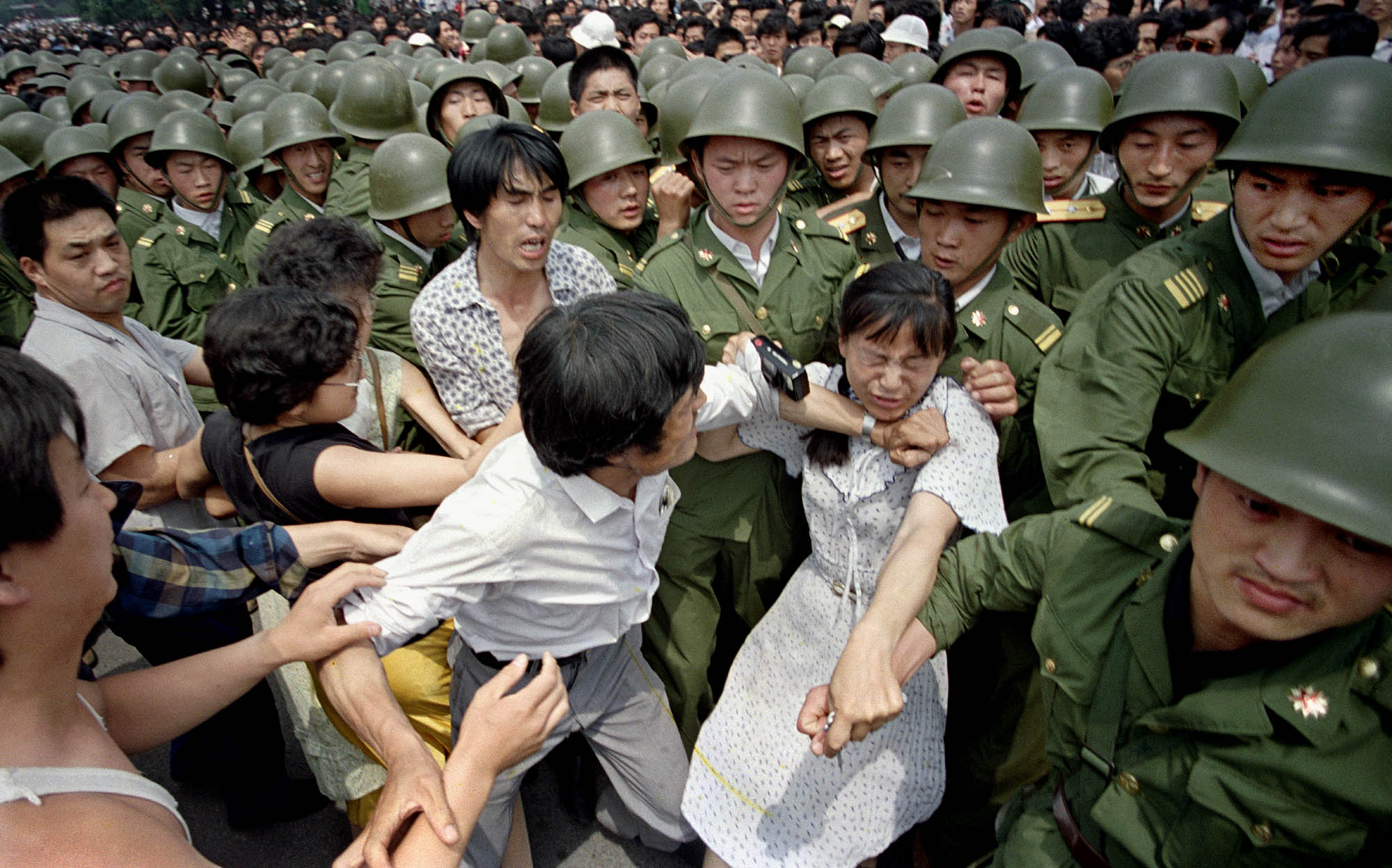

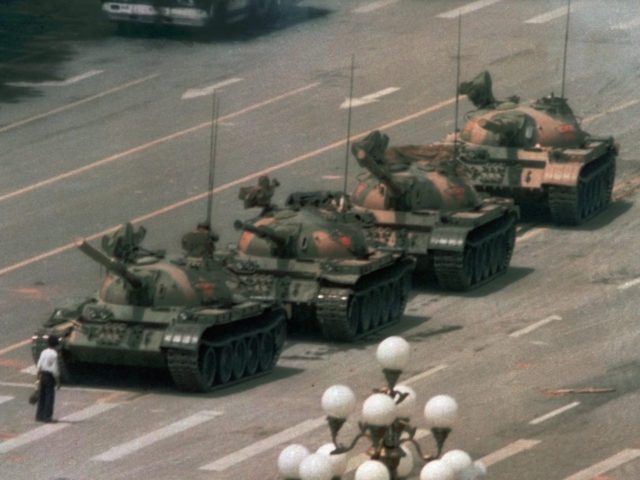
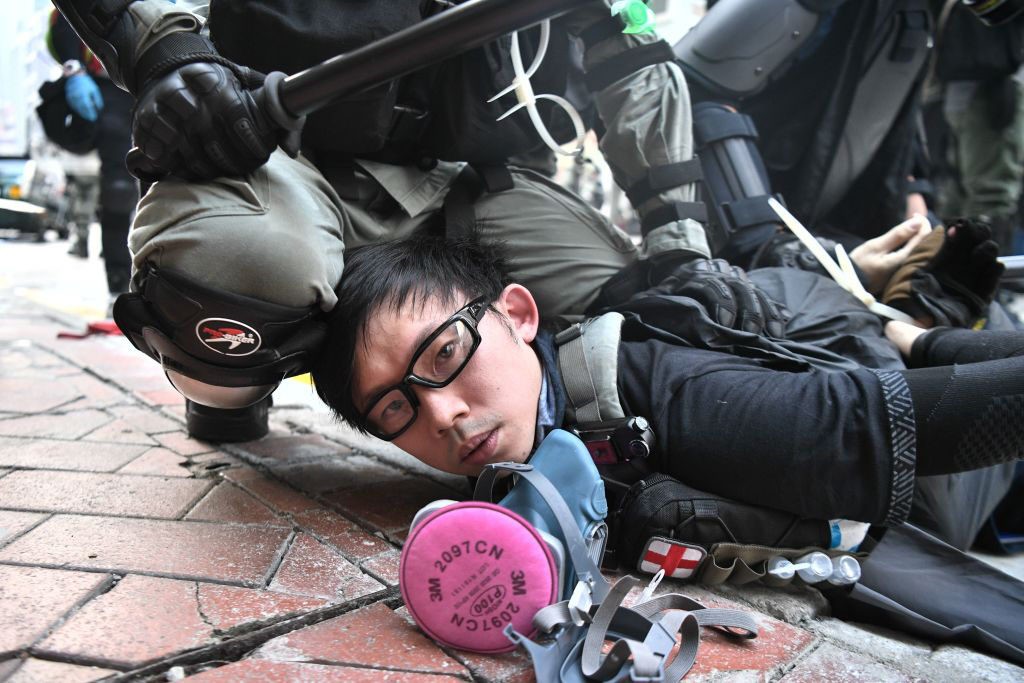
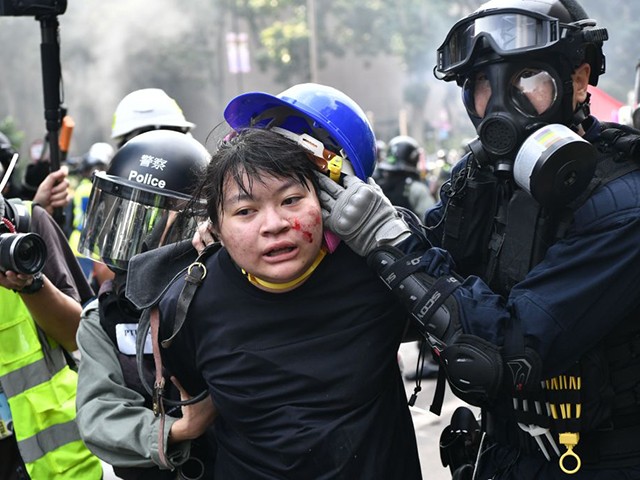

It is, indeed, a cynical ploy by the CCP, equating legitimate criticism of the Chinese communists with illegitimate racism against the Chinese people. And yet the ploy could prove effective, if the West carelessly conflates the Chinese Communist Party with the Chinese.
So we can see: If the CCP strategy is to conflate Chinese communism—including the current state-capitalist “Market Maoist” approach—with China itself, then our strategy must be the opposite: We must seek to widen the divide between the CCP and the Chinese people, not only in China, but also among Chinese communities around the world.
We can do this by emphasizing the many crimes of the CCP, and yet, at the same time, we in America must step up our own game. That is, we have to do everything we can to clear away the faults in ourselves. And we have, at times, been at fault.
We know that anti-Asian incidents and hate crimes have occurred in the United States. Since such despicable acts are not official policy, but rather the dirty deeds of the few, it should be easy enough to make amends, do justice, provide protection, and secure the social peace. Indeed, if we wish to unite this nation, we need to keep it from being divided by racism and nastiness. We owe that much to our fellow citizens, as well as to ourselves, because we all have to live in good conscience in this country.
Moreover, for the reasons we have seen, such action isn’t just a matter of civility and decency here at home or of law and order; such action, in fact, is a vital part of our national soft-power strategy.
We might pause here to note that the world’s population is about 11 percent white. That means, of course, that “people of color” are 89 percent of the planet. So if the struggle between the USA and the CCP is seen through a white vs. non-white prism—then America, which is hardly itself all white, has a big problem.
Yes, the world situation today is daunting. But we’ve faced daunting situations in the past, and we’ve prevailed. The critical thing is to learn the lessons of what worked in the past—because then we can do it again.
World War II and Frank Sinatra
World War II might be best remembered as a battle of bullets and bombs, but it was also a battle of ideas, freedom vs. fascism. Once again, we can see the dichotomy of hard power and soft power: Should the world enjoy liberty and democracy, or should it suffer terror and tyranny? The idealistic answer—that we should strive for the former while fighting the latter—was no small part of our success in the war, because it galvanized not only the American people, but also many peoples around the world.
For instance, on January 1, 1942, the U.S. and 25 other allied nations signed a joint declaration of wartime solidarity for the purpose of defeating fascism and for the promotion of freedom and liberty worldwide. As the document put it, the United Nations, as the 26 nations now called themselves, believed that “complete victory over their enemies is essential to defend life, liberty, independence and religious freedom, and to preserve human rights and justice in their own lands as well as in other lands.” Looking back at the declaration nearly 80 years later, it seems a bit naive, since the non-free Soviet Union was a signatory, and yet the high hopes of the world were a key asset to the U.S. in the war and did, in fact, shape many post-war attitudes in other nations. Moreover, the disappointments of the actual United Nations, the formal organization launched in 1945, were still in the future.
But for Uncle Sam to gain the stature of leader of the free world, he had to show the world that he was living by his own ideals. And so improving harmony at home was a major preoccupation even during the fighting.
To that end, our wartime commander-in-chief, President Franklin D. Roosevelt, declared the third week of February 1943 to be National Brotherhood Week; patriotic posters, emphasizing the message, we’re all in this together, were seen everywhere. As FDR put it in a proclamation:
We are fighting for the right of men to live as members of one family rather than as masters and slaves. We are fighting that the spirit of brotherhood which we prize in this country may be practiced here and by free men everywhere.
In those days, Hollywood, too, wanted to help. In 1945, Frank Sinatra, then at the peak of his popularity with teenage bobbysoxers, released a short film, The House I Live In, aimed at reinforcing the brotherhood message:
In the movie, Sinatra plays himself at a studio recording session; he steps out into the alley to take a break and sees a pack of ten boys picking on a single boy. Sinatra steps forward and breaks up the fracas, quickly discovering that it’s an antisemitic incident. “We don’t like his religion,” one of the pack says, pointing to the lone Jewish boy.
Sinatra calms the pack down, explaining:
Look, fellas: Religion makes no difference. Except maybe to a Nazi—or somebody as stupid. Why, people all over the world worship God in many different ways. God created everybody. He didn’t create one people better than another. Do you know what this wonderful country is made of? It’s made up of a hundred different kind of people.
Having soothed the situation, Sinatra then returns to the studio and sings, “The house I live in, a plot of earth, a street/ The grocer and the butcher, and the people that I meet/ The children in the playground, the faces that I see/ All races and religions, that’s America to me.”
Sinatra thus upheld the vision of a tolerant and fair-minded America, an America that could not only live with itself at home, but also present itself to the world as a non-hypocritical champion of freedom and democracy.
We needed that soft power—joined, of course, with hard power—to defeat Hitler’s Nazi Germany. And after the fighting was over, we would need it, again, to separate Nazism from Germany. That is, we would punish the worst Nazis, forgive the rest, and put the German people as a whole on a path toward democracy, helping them to rebuild along the way.
So again, we see the key strategy: Our enemy is a nation’s evil regime, not the nation itself.
Victory in the Cold War
During World War II, American messaging was made easier because Hitler’s Nazis were so obviously repulsive and warlike. It wasn’t so hard to convince people around the world that the Nazis were the enemy of all humankind.
However, after 1945, Josef Stalin’s Soviet communists, while themselves plenty blood-drenched and eager to dominate a big chunk of the post-war world, were at great pains to present themselves to the world as both civilized and peaceful. In the struggle for the heart of Pascal’s worldly queen of public opinion, the U.S. had to step up its game and clean up its act. Only then could we expect billions of newly de-colonialized people around the world—what was to become known as the Third World, in contrast to the First World of capitalism and the Second World of communism—to prefer freedom over dictatorship.
In particular, the U.S. had to deal with its nagging stain of racial discrimination; that was an obvious weakness that critics around the world—often egged on by Soviet propagandists—were quick to seize upon. So the U.S. resolved to fix the problem; that is, we would reform the house that America lives in.
Such self-improvement was, indeed, a key part of our national Cold War strategy; we would wield the hard power of armies and A-bombs abroad, and at same time deploy the soft power of racial justice at home.
Back in 1988, Mary L. Dudziak wrote in the Stanford Law Review about the civil rights movement in this Cold War context:
In the years following World War II, racial discrimination in the United States received increasing attention from other countries. Newspapers throughout the world carried stories about discrimination against non-white visiting foreign dignitaries, as well as against American blacks.
In the face of this embarrassment, Dudziak continued, “U.S. government officials realized that their ability to sell democracy to the Third World was seriously hampered by continuing racial injustice at home.” And so it became necessary to “promote civil rights within the United States” as a part of the “more central U.S. mission of fighting world communism.”
So when a Haitian diplomat was refused service at a hotel in Biloxi, Mississippi, it became literally an international incident. Indeed, media from around the world harped on the negative; the headline of a newspaper in Fiji read, “Persecution of Negroes Still Strong in America.” And in India: “Treatment of Negroes a Blot on U.S.”
The Soviets, of course, were alert to every opportunity to heap scorn on Uncle Sam. The communist newspaper Trud wrote of “the increasing frequency of terroristic acts against negroes.” Indeed, in 1949, the U.S. Embassy in Moscow cabled back to Washington, DC, that the race issue was “one of the principal Soviet propaganda themes regarding the United States.”
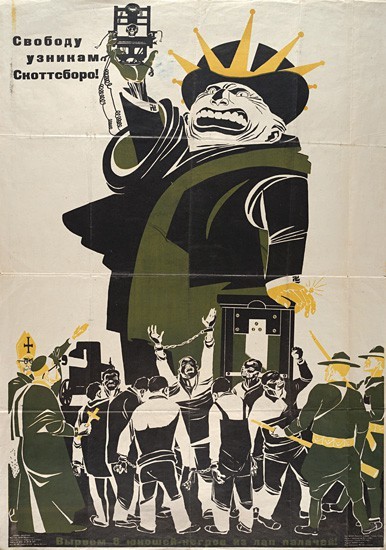
In light of these challenging world dynamics, American leaders saw progress in civil rights not only as a moral cause, but also as a geopolitical necessity. That’s why, for example, the U.S. Justice Department wrote in its amicus brief for the Brown vs. Board of Education school desegregation case of 1954, “It is in the context of the present world struggle between freedom and tyranny that the problem of racial discrimination must be viewed.”
The brief added, “The United States is trying to prove to the people of the world, of every nationality, race and color, that a free democracy is the most civilized and most secure form of government yet devised by man.” The authors of these words were tough-minded Cold War liberals of both parties, supported first by the Democrat Truman administration and then by the Republican Eisenhower administration.
As we all know, the Supreme Court decided the Brown case with 9:0 unanimity—that is, it was another instance of bipartisanship. Newspapers in the United States and throughout the world celebrated Brown as a “blow to communism.” Which indeed it was.
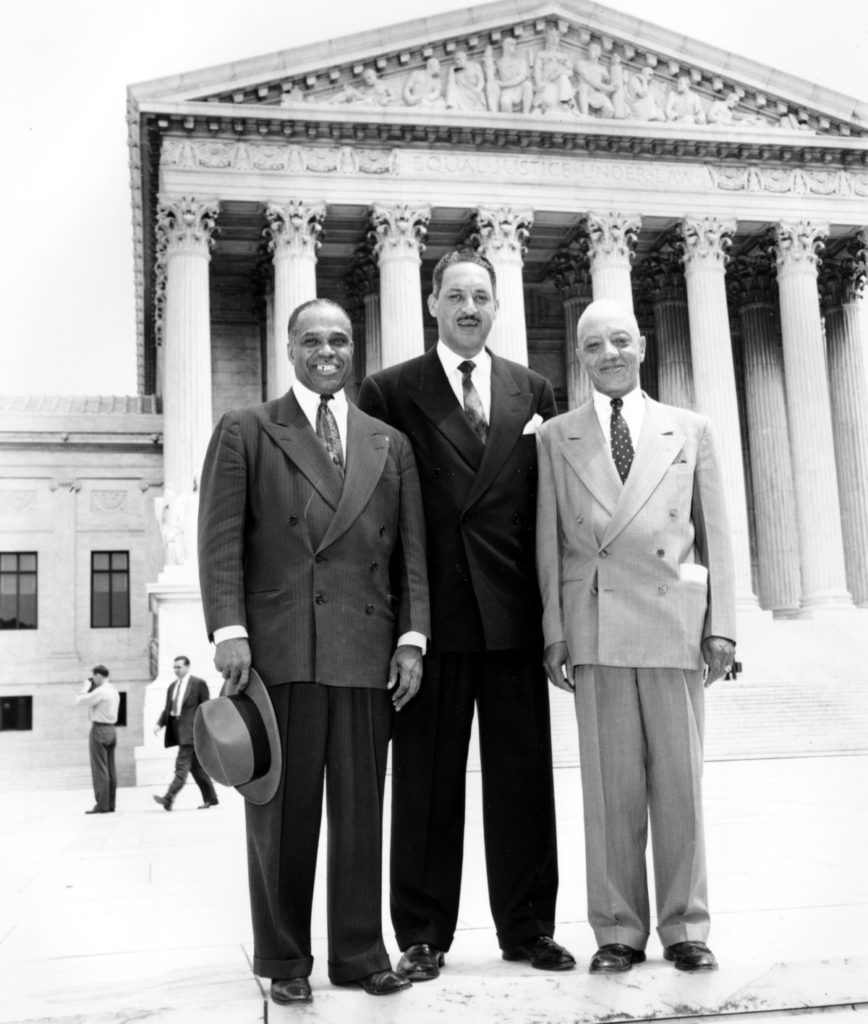
In the long run, over more than four decades, the U.S. not only reformed itself, it also succeeded in its Cold War aim: separating the Soviet Communist Party from the Russian people. That is, today, the communists are gone, but Russia is still there.
Admittedly, Russia isn’t the friend that we might have hoped for, but neither is it an implacable ideological foe, as were the communists. Indeed, as has been argued here at Breitbart News, we might yet be able to work with post-communist Russia against the communists in China.
Victory in Cold War II?
Just on May 13, Axios reporter Bethany Allen-Ebrahimian flagged a remarkable and heartening development. Under the headline, “College Democrats and Republicans denounce racism and CCP,” Allen-Ebrahimian took note of an open letter, “Concerning the Threat of Authoritarian Influence and the Defense of Public Institutions,” signed by young Republicans and young Democrats.
Allen-Ebrahimian explained, “Why it matters: Young people are showing Congress it’s possible to denounce both China’s authoritarianism and anti-Chinese racism in America at the same time.”
That’s the critical moral element, as well as the winning political strategy: twinning opposition to communism with opposition to racism. If we want American policy to be effective in this race-conscious, media-intensive world, we have to be mindful of the need for both “oppositions.”
In other words, the letter is a political masterstroke, with credit going to to the Athenai Institute, which convened the signatories. The letter reads, in part:
In response to calls from within Chinese civil society, and in light of the continued struggles of Hong Kongers, Mongolians, Taiwanese, Tibetans, Uyghurs, and others, we are compelled to voice our concerns over the present state of academic freedom, and bring to light the continued exploitation of liberal, democratic academic institutions by authoritarians. We have prepared this appeal so you may understand the scope of this threat, the need to counter it, and the precise actions demanded by our circumstances.
The language above is familiar to China hawks. But what’s not familiar is the fact that the letter is bipartisan. In America, bipartisanship is power, because more is stronger than less; as they say, effective politics is about addition, not subtraction.
So those who wish to build a larger anti-communist coalition must look for ways to bring more people aboard. And to that constructive end, the letter continues, “We further seek to condemn, in the most unequivocal terms, all anti-Asian sentiment, violence, and hateful acts.”
Indeed, the letter emphasizes the same “splitting tactic” that we used in the past to separate Nazis from Germans and Communists from Russians:
It is imperative that we distinguish this totalitarian regime from the Chinese people, whom we must steadfastly defend from abhorrent acts of xenophobia, racism, and hatred. We must act to give voice to the long-oppressed, be they Chinese, Hong Konger, Mongolian, Taiwanese, Tibetan or Uyghur.
We can’t yet say who will prevail in Cold War II. But we know this much right now: If America is clean from the stain of racism, then we will have a better message to the world—and the contrast with the CCP, including its racism, will be all the starker.
For instance, we can seize on headlines such as this, from Foreign Policy magazine on April 15: “China’s Racism Is Wrecking Its Success in Africa.” As the article details, China’s condescending and hostile attitudes towards Africans, both in China and in Africa itself, are turning African opinion against it.
And we can jump on this headline, too, atop an opinion piece in the May 14 Washington Post: “The world is waking up to the character of the Chinese Communist Party.” In the words of writer Josh Rogin, international businesses made a “Faustian bargain” with China, which now is “costing them dearly”—and is costing the world even more.
And this, too, from The Washington Post on May 21: “China to impose sweeping national security law in Hong Kong, bypassing city’s legislature.” In other words, the CCP is now snuffing out freedom in Hong Kong—an action every freedom-lover must deplore. As conservative columnist Henry Olsen argued, “The United States should stand up for its democratic values and stand with Hong Kong’s citizens”–and at the same time, the U.S. should revoke Hong Kong’s special trading status now that it’s been swallowed up by the Red Dragon.
These media items bespeak soft power in action. That is, the world is coming to see China’s communist regime for what it is–and that helps the U.S. make its pro-freedom case to other countries. To put this another way, the Pascalian queen of the world, public opinion, is smiling on our freedom, which seeks to improve itself and uphold liberty—and frowning on the CCP’s totalitarianism, which seeks to both hide its mistakes and extend its clampdown. (Although even the CCP can’t hide everything; on May 16 it was forced to admit that, in early January, it had destroyed samples of the virus from “unauthorized labs,” thus confirming an accusation made by Secretary of State Mike Pompeo; so now, what else remains to be admitted?)
To be sure, even as we gain in soft power, we can never ease up on our hard power–that is, military might–because the CCP certainly won’t ease up on theirs.
And yet if we also think about our moral standing in the world—keeping our honor clean, as the Marines would put it—we can draw a sharp contrast between the cruel idea of communism and the kind idea of liberty. Do the vast majority of the Chinese people want to live under a regime that squelches freedom, even as it produces infernal bioweapons? Of course not. So our challenge is to prove, by word and deed, that freedom and peace are better choices.
As we learned in both World War II and Cold War I, the pen that draws that moral contrast—or writes a good-hearted Frank Sinatra song—is as important as the sword.